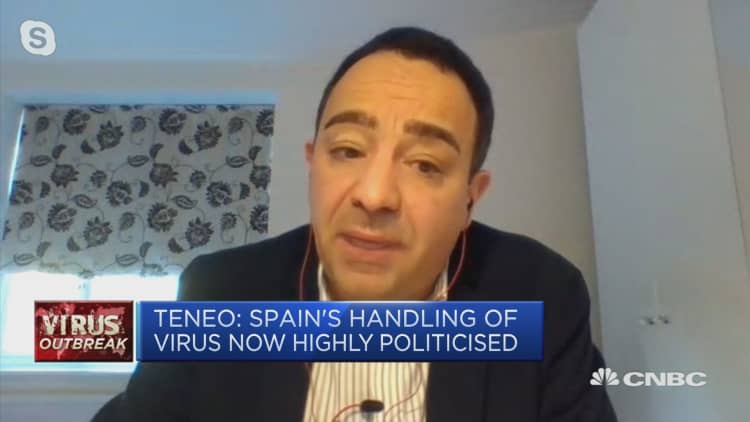Political fragmentation is intensifying in Italy as the coronavirus pandemic gives new ammunition to anti-establishment parties and challenges its European membership.
Italy has the highest death toll from the Covid-19 outbreak in Europe and has desperately lobbied its partners in the region for financial support to deal with the impact of the health crisis. However, northern European nations have been reluctant to give the Italian government everything it wants — which in turn has fueled a toxic debate back in Rome.
"It is a debate to a large extent detached from reality," Wolfango Piccoli, co-president at risk advisory Teneo, told CNBC's Squawk Box Europe Tuesday.

However, the debate was helpful for both the prime minister and the opposition, Piccoli said, suggesting that it was diverting attention away from the "mismanagement of the health crisis" and the country's strategy for an economic recovery.
Instead, the political debate in Italy is mainly centred around what the European Union will do to rescue countries like itself, where the health crisis has caused deep economic challenges.
Italy has announced about 16 billion euros ($17.34 billion) in immediate fiscal measures to help its economy. However, with a public debt pile of around 130% of GDP (gross domestic product), the government has so far fallen short of providing a massive stimulus package that will deteriorate its finances even further.
Finance ministers of the euro zone — the 19-country group which uses the euro — agreed to a fiscal package for the bloc worth up to 240 billion euros ($260 billion). This included a credit line via their crisis fund, the European Stability Mechanism (ESM).

It means that Italy, like any other virus-hit nation in the euro zone, could borrow money from the ESM at more favourable rates to support its economy, instead of tapping financial markets.
However, Italian anti-EU parties are opposed to these loans, arguing that the money would call into question Italy's sovereignty and result in new austerity measures.
As a result, Italian Prime Minister Giuseppe Conte faces a tough choice: either he requests an ESM loan, which anti-establishment parties will use to criticize the government and Europe; or he refuses the money, which could validate anti-EU sentiment at a time when a growing number of Italians are questioning its membership of the group.
In a survey earlier this month by Tecnè, a consultancy group in Italy, 42% of respondents said they wanted to leave the European Union. This was up from 26% in November 2018.
In addition, the latest voting intentions point to growing support for anti-immigration and anti-EU parties, according to polling for Politico.
The right-wing populist Lega party, led by Matteo Salvini, is currently the most popular in Italy, followed by the Democratic Party. However, support for the far-right Brothers of Italy party has increased since the start of the year and it's now nearly as popular as one of the ruling parties, the leftist Five Star Movement.
"I don't think that (Prime Minister) Conte will be one who's going to stick around for much longer," Piccoli from Teneo, told CNBC, suggesting a potential reshuffle in government.


